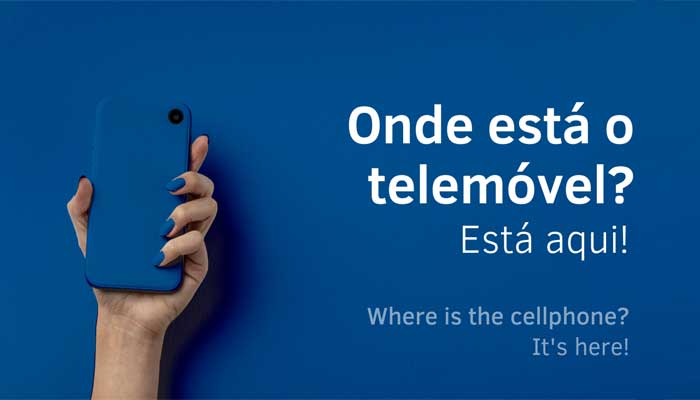Olá! Today we will learn some personal objects and how to locate them. We will also learn the verb “ter” (to have) and the adverbs “aqui” (here), “aí” and “ali” (there). Finally, we will know how to express ownership with the possessive pronouns.

In order to ask “what is” something, you already know you should say “o que é”:
A: O que é isso? (What is that?)
B: Isto é uma caneta. (This is a pen.)
A: O que é isto? (What is this?)
B: Isso é um telemóvel. (That is a cell-phone)
A: O que é aquilo? (What is that, over there?)
B: Aquilo é uma carteira. (It’s a wallet)
On the other hand, if you want to ask “Where is” something (or someone) you should say “onde está”:
A: Onde está a caneta?
B: A caneta está aqui.
A: Onde está o telemóvel?
B: O telemóvel está aí.
A: Onde está a carteira?
B: A carteira está ali.
In Portuguese, we have three words (aqui, aí and ali) for the words “here” and “there”.
| Aqui | Here |
| Aí | There |
| Ali | Over there |
The words “Aqui”, “aí” and “ali” follow the same principle as the words “isto”, “isso” and “aquilo” that we learn previously.
The adverb “aqui” means “here” and it’s used to mention locations close to the speaker. And the adverbs “aí” and “ali” mean “there”. We should use the first one to mention locations close to the listener and the second one for locations far from the speaker and far from the listener.
Please check the logic:
| Isto é uma caneta. | A caneta está aqui. |
| Isso é um telemóvel. | O telemóvel está aí. |
| Aquilo é uma carteira. | A carteira está ali. |
Consequently, the sentences on the left column answer the question “O que é…?” (What is…?) and on the right answer the question “Onde está…?” (Where is…?).
O que é isso? / O que é que é isso?
Isto é uma caneta.
Onde está a caneta? / Onde é que está a caneta?
A caneta está aqui.
As you see, we have two ways to make exactly the same question. That’s because we can put the words “é que” in front of the interrogative word. The sentences have the exact same meaning and they are both correct. This is just about preference. Let’s check other examples with questions that we already learned:
- Como te chamas? / Como é que te chamas?
- Como estás? / Como é que estás?
- De onde és? / De onde é que és?
Further, we’ve learnt the verb “ter” (to have):
| Eu | tenho |
| Tu | tens |
| Ele / Ela / Você | tem |
| Nós | temos |
| Eles/ Elas / Vocês | têm |
This verb is used the same way than in English:
A: Desculpe, tem uma caneta?
B: Sim, tenho. Faz favor.
A: André, tens dinheiro?
B: Sim, tenho 30 euros.
A: Têm um cigarro?
B: Desculpe, não temos.
Finally, like in english, to express ownership we use possessive pronouns. If you look at the table below, you can notice that we make always agrees with gender of the noun next. The exception is ele, ela, eles and elas. In that case is about the person who owns the object.
| Eu | o meu carro | a minha casa |
| Tu | o teu carro | a tua casa |
| Você | o seu carro | a sua casa |
| Nós | o nosso carro | a nossa casa |
| Vocês | o vosso carro | a vossa casa |
| Ele | o carro/ a casa dele |
| Ela | o carro/ a casa dela |
| Eles | o carro/ a casa deles |
| Elas | o carro/ a casa delas |
To understand the previous table better, pay attention to the next examples:
Eu tenho uma garrafa de água. (I have a bottle of water)
A minha garrafa de água está aqui.
Tu tens carta de condução. (You have a driving license)
A tua carta de condução está aí.
A Inês tem um carro.
O carro dela está ali. / O carro da Inês está ali.
As you can see above, there’s no article along with the proposition “de” (in carta de condução and garrafa de água). That happen because the words condução (driving) and água (water) are not countable, so we don’t use the article.
We also don’t use articles with abstract or non specific words. For example:
- Uma história de amor (a love story)
- Eu gosto de animais (i like animals)
On the third example (O carro da Inês) we use the article, because persons and objects are always specific. They never appear without the respective articles.
Conclusion
Do you want to learn more and put your all the knowledge in practice? Do you want to speak Portuguese with Portuguese people? It’s simple: talk to us!
Remember, we are in different cities of Portugal and also online!
See you soon.
